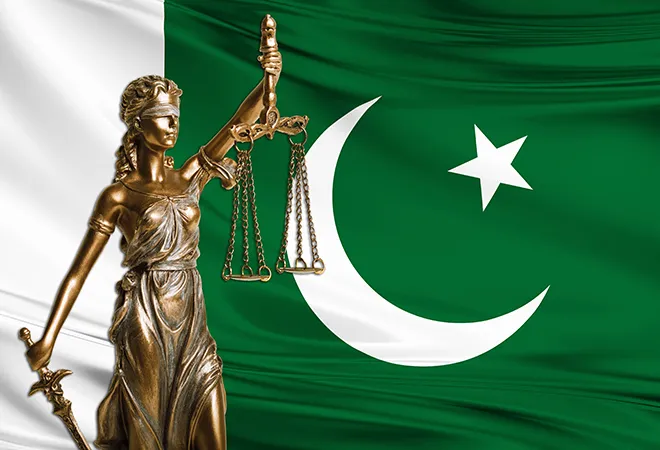
Pakistan has hit out at the US government’s re-designation last week of Pakistan as a “country of particular concern” on religious freedom for having engaged in or tolerated “systematic, ongoing, egregious violations of religious freedom.” Pakistan’s foreign ministry said the label was “unilateral and arbitrary” and the result of a biased evaluation process (particularly so as it does not include India, goes the reasoning).
However, just three days after the US Department listed Pakistan as a violator of religious freedoms, the reality was again thrown into sharp relief when a young academic has been sentenced to death for blasphemy by a district court in Multan, Punjab, on 21 December.
Junaid Hafeez, 33, is the latest to be convicted under a malevolent law on blasphemy. His family said they will file for an appeal. Amnesty International called the death sentence “vile and gross miscarriage of justice.”
The blasphemy law under Section 295-C of the Pakistan Penal Code is a prime example of savagery a modern nation could impose on its citizenry with legal sanction. The law, which has enormous scope for misapplication and abuse, has been routinely misused to hound members of Pakistan’s minority communities; grab land and property; and settle personal scores. Even unproven allegations of insulting Islam risk a violent and bloody death instantly at the hands of a rabid mob. If allegations progress beyond vigilantism to the criminal justice system, lawyers are murdered for taking on the case of the alleged blasphemer. Judges, if they do not shy away from hearing a blasphemy case, won’t deliver judgements that will offend hardline Islamists in society.
The law, which has enormous scope for misapplication and abuse, has been routinely misused to hound members of Pakistan’s minority communities; grab land and property; and settle personal scores.
The exact wording of Section 295-C of Pakistan Penal Code is this:
“Whoever by words, either spoken or written, or by visible representation or by any imputation, innuendo, or insinuation, directly or indirectly, defiles the sacred name of the Holy Prophet Muhammad (peace be upon him) shall be punished with death, or imprisonment for life, and shall also be liable to fine.”
The option of life imprisonment was made defunct after a 1991 Federal Shariat Court judgement. Therefore, a fixed death penalty await all those who are found guilty.
Hafeez was arrested in March 2013 after he was accused of making derogatory comments about the Prophet Muhammad. For the last six years, he had been languishing in solitary confinement in a cell of the Central Jail, Multan. Meanwhile, seven judges were transferred. His first lawyer Rashid Rehman Khan, who was openly threatened in court by religious leaders and other lawyers for taking on the case, was shot dead in May 2014 with impunity.
A description of the case in the English Pakistani press makes it clear the travesty of justice meted out to Hafeez.
Hafeez studied a master’s degree in English from Jackson State University in the US on a Fulbright Scholarship, specialising in American literature, photography and theatre. After returning to Pakistan in 2011, he took up the job as lecturer at Bahauddin Zakariya University in Multan, where he worked until his arrest.
A person with secular and progressive outlook, the lecturer often invited rights activists to the university campus for guest lectures and engage with students. After one such lecture in 2013, delivered by Qaisra Shahraz, a British novelist and scriptwriter of Pakistani origin whose writings explored women’s rights, some students accused Hafeez and Shahraz of having passed blasphemous remarks.
When the Multan police registered a case against Hafeez, it did so on the grounds of some allegedly doctored printouts of blasphemous material and comments attributed to him. His computer was seized and the police forced him to reveal his login details — without any court order as required under the law. The police subsequently interpreted some content found in the computer as blasphemous. The blasphemy allegations put Hafeez behind bars as Shahraz left Pakistan.
Hafeez was also charged with ‘supporting’ the themes in Shahraz’s novels. When one of the prosecution witnesses levelled the same accusation, Hafeez’s lawyer brought Shahraz’s books to the court and asked the witness to point out the blasphemous contents to the judge. The witness could not — as could neither read nor understand English.
Blasphemy is an extremely sensitive topic in Pakistan, where law enforcement agencies as well as the justice system are mortally afraid to be seen protecting or bringing relief anybody accused of it.
A report in The Guardian quoted Hafeez’s current lawyer, who was not named, as saying that during the trial, the prosecutor had not presented concrete evidence against Hafeez but had instead warned the judge that he was “against Islam” and that in Pakistan the case was “sensitive”. “It was the point I realised they were just using the religious card, which was immoral and unethical precedent in the court,” the lawyer alleged.
In a statement released by Hafeez’s family after the death sentence was pronounced, his family said the failure to apprehend those who shot his lawyer Rehman dead in 2014 signalled impunity for other would-be vigilantes. “Could any judge in such circumstances take the risk of doing justice? Those who could were transferred from the district or brought under pressure by groups of lawyers operating as a mafia.”
Indeed, blasphemy is an extremely sensitive topic in Pakistan where law enforcement agencies as well as the justice system are mortally afraid to be seen protecting or bringing relief anybody accused of it. One case that attracted worldwide opprobrium involved a Christian lady named Asia Bibi. In November last year, Asia Bibi, who spent eight years on death row, was freed from prison after the country’s Supreme Court overturned her conviction by lower courts. The Supreme Court ruling at the time was widely hailed as historic, but given the violent reaction by Islamist parties and groups to it — and the meek civil society and government response to such elements — the euphoria was short-lived. Some Islamist thugs openly called for the assassination of the Supreme Court judges who heard the case. Early this year, Asia Bibi and her family left the country for Canada for safety reasons.
The case attracted worldwide attention in January 2011 when Salman Taseer, a prominent leader of the then ruling Pakistan People’s Party and Governor of the country’s populous and politically most important province Punjab, who spoke out in support of Bibi, was gunned down by his own bodyguard in Islamabad. Nearly two months later, the Federal Minister for Minority Affairs, Shahbaz Bhatti, a Christian, was shot dead in Islamabad after pushing for reform of the harsh blasphemy laws and speaking in favour of Bibi. Mumtaz Qadri, the guard who shot Taseer 28 times, was since then treated as a national hero by religious parties and jihadi groups. After he was executed in 2016, Qadri has been proclaimed a martyr. As a monument of religious bigotry in the nation, there is a large shrine dedicated to Qadri on the outskirts of Islamabad.
Though the Supreme Court has issued a landmark verdict in the Asia Bibi case, there was nothing to cheer. The court has spoken nothing about the merits of the blasphemy law. It just set aside the high court’s decision due to lack of evidence produced by the prosecution against the alleged blasphemy. The Section 295-C stays intact in the Penal Code and so is its potential to misuse.
It is a disgrace that the country cannot at least amend the black law to curb its misuse. But then, the sad reality is that four decades after military dictator Gen Ziaul Haq’s Islamisation programme, Pakistan’s society is so radicalised now that not even a reasoned talk about rewriting, let alone repealing, the blasphemy law is possible.
The views expressed above belong to the author(s). ORF research and analyses now available on Telegram! Click here to access our curated content — blogs, longforms and interviews.




 PREV
PREV


